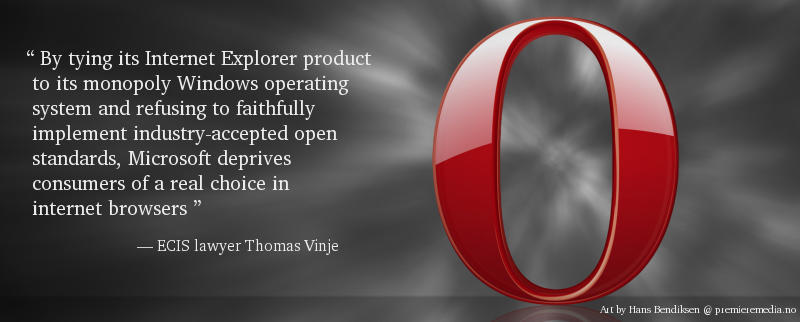Yesterday the browser maker Opera cried wolf submitting a complaint to the European Commission saying that Microsoft, through their dominant desktop prevalence/monopoly have an unfair advantage with Internet Explorer (IE) that is both unfair to their customers and the web as a whole.

I’ve let this settle for a good 24 hours before chucking my penny’s worth in. In short: I think Opera’s complaint cannot be allowed to be upheld, but0 it probably will, mainly because the EU seems to hate Microsoft.

This is nothing new for Microsoft. They’ve been through this with the US Department of Justice over bundling IE with Windows 95. They’ve also fought with the EU over Windows Media Player (WMP) amongst other things.
The root of all this fuss is over Microsoft having dominant market share, a situation they’ve found themselves in after two decades of wheeling-n-dealing. I can’t defend Microsoft’s iffy business practices but they’ve managed to do what every business would like to; but they’re here now; most of you use their operating system on a daily basis.
Opera wants Microsoft to unbundle IE from Windows (must like WMP in EU copies of Windows) or install other browsers to give the user a choice. Furthermore, Opera wants Microsoft to be forced to adhere to web-authoring standards. At first glances, Opera appears to be a little crabby that after years of singing the right song, they’re still in last place when it comes to users. It goes: IE6, IE7, Firefox, Safari, then Opera.
For the past year or so Opera lovers have quoted superior rendering and standards adherence as a good reason to use Opera over other browsers but the fact is, as somebody who is constantly dibbling around with cross-browser CSS positioning, form elements and javascript, I can tell you first-hand that Opera has just as many non-standard quirks, often so damaging or irregular that Opera remains unsupported. Anyway, let’s skip over this web-developer’s complaints…
How does the bundling of IE with Windows limit people’s choice? It doesn’t. You’re not forced at gunpoint or otherwise to use IE (anymore) in order to use yuor Windows computer. This wasn’t the case with Windows 95 (and parts of 80, 2000 and even XP) where Explorer (the file-management tool) and Internet Explorer were essentially the same thing. With Vista, if you choose not to use IE as your default browser all URL requests can be routed to another browser — even if you stuff the URL into an Explorer window.
You could argue that people need to use IE that first time to download their browser of choice and that’s true (unless you bring the installer in via offline/local-networked routes) but forcing MS to include every browser is a complete pain in the arse; it would swell Windows installs into multi-DVD hogs because if you had to do this with Browsers, you’d have to do the same with games, email clients, chat clients, telnet clients and servers. You would essentially need every version of every type of application MS included with Windows. It would be immeasurably idiotic!
Just what the hell does this mean for Apple?! They bundle their media player, their iTunes store, their DV editing software, amongst many other apps all in an incredibly tight cohesive mesh. If this complaint is upheld again Microsoft, it won’t be long before OSX is torn apart.
I see the web-standards argument but from a liberties point of view, I just can’t agree that a public body could see itself fit to legally mandate what standards browser-companies adhere to. This isn’t an irreversible monopoly — the tide is already turning with millions of internet users flocking to Firefox and Safari, some of those, like yours truly, people dodging Windows completely in favour or alternate operating systems.
I’m sorry Opera but you’re not targeting the issue here — it’s not Microsoft’s fault that nobody* knows about your browser. If you want to fix this, you need to stop people having Windows forced on them by manufacturers when they buy new PCs. Lobby for unbundling of operating systems so people have the choice to go Linux/BSD/etc if they want. I’m willing to bet you’d probably find some real evidence of anti-competitive practices too.